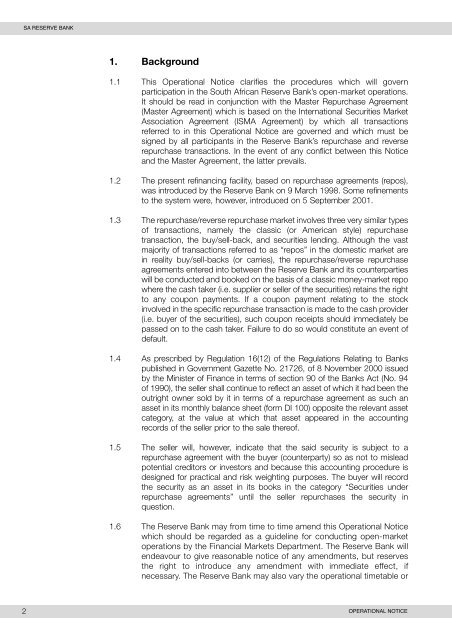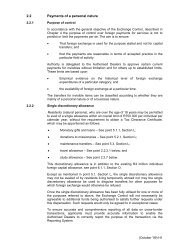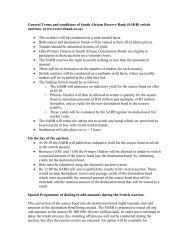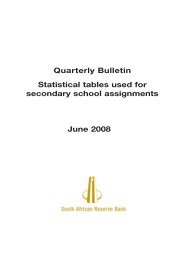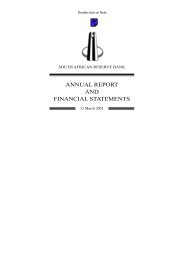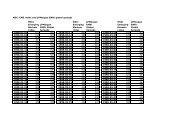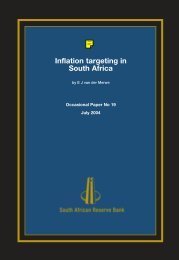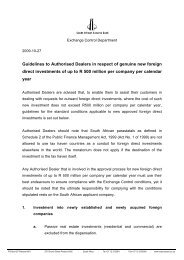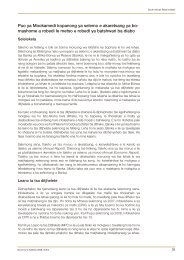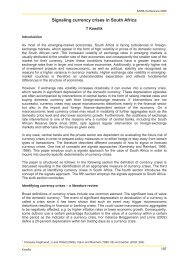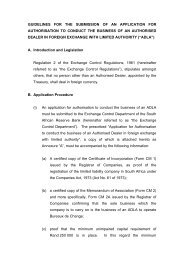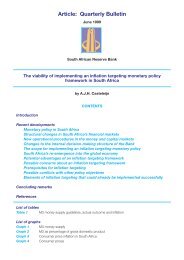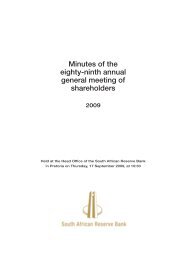Operational Notice - South African Reserve Bank
Operational Notice - South African Reserve Bank
Operational Notice - South African Reserve Bank
You also want an ePaper? Increase the reach of your titles
YUMPU automatically turns print PDFs into web optimized ePapers that Google loves.
SA RESERVE BANK1. Background1.1 This <strong>Operational</strong> <strong>Notice</strong> clarifies the procedures which will governparticipation in the <strong>South</strong> <strong>African</strong> <strong>Reserve</strong> <strong>Bank</strong>’s open-market operations.It should be read in conjunction with the Master Repurchase Agreement(Master Agreement) which is based on the International Securities MarketAssociation Agreement (ISMA Agreement) by which all transactionsreferred to in this <strong>Operational</strong> <strong>Notice</strong> are governed and which must besigned by all participants in the <strong>Reserve</strong> <strong>Bank</strong>’s repurchase and reverserepurchase transactions. In the event of any conflict between this <strong>Notice</strong>and the Master Agreement, the latter prevails.1.2 The present refinancing facility, based on repurchase agreements (repos),was introduced by the <strong>Reserve</strong> <strong>Bank</strong> on 9 March 1998. Some refinementsto the system were, however, introduced on 5 September 2001.1.3 The repurchase/reverse repurchase market involves three very similar typesof transactions, namely the classic (or American style) repurchasetransaction, the buy/sell-back, and securities lending. Although the vastmajority of transactions referred to as “repos” in the domestic market arein reality buy/sell-backs (or carries), the repurchase/reverse repurchaseagreements entered into between the <strong>Reserve</strong> <strong>Bank</strong> and its counterpartieswill be conducted and booked on the basis of a classic money-market repowhere the cash taker (i.e. supplier or seller of the securities) retains the rightto any coupon payments. If a coupon payment relating to the stockinvolved in the specific repurchase transaction is made to the cash provider(i.e. buyer of the securities), such coupon receipts should immediately bepassed on to the cash taker. Failure to do so would constitute an event ofdefault.1.4 As prescribed by Regulation 16(12) of the Regulations Relating to <strong>Bank</strong>spublished in Government Gazette No. 21726, of 8 November 2000 issuedby the Minister of Finance in terms of section 90 of the <strong>Bank</strong>s Act (No. 94of 1990), the seller shall continue to reflect an asset of which it had been theoutright owner sold by it in terms of a repurchase agreement as such anasset in its monthly balance sheet (form DI 100) opposite the relevant assetcategory, at the value at which that asset appeared in the accountingrecords of the seller prior to the sale thereof.1.5 The seller will, however, indicate that the said security is subject to arepurchase agreement with the buyer (counterparty) so as not to misleadpotential creditors or investors and because this accounting procedure isdesigned for practical and risk weighting purposes. The buyer will recordthe security as an asset in its books in the category “Securities underrepurchase agreements” until the seller repurchases the security inquestion.1.6 The <strong>Reserve</strong> <strong>Bank</strong> may from time to time amend this <strong>Operational</strong> <strong>Notice</strong>which should be regarded as a guideline for conducting open-marketoperations by the Financial Markets Department. The <strong>Reserve</strong> <strong>Bank</strong> willendeavour to give reasonable notice of any amendments, but reservesthe right to introduce any amendment with immediate effect, ifnecessary. The <strong>Reserve</strong> <strong>Bank</strong> may also vary the operational timetable or2 OPERATIONAL NOTICE


